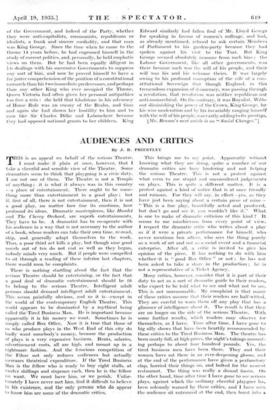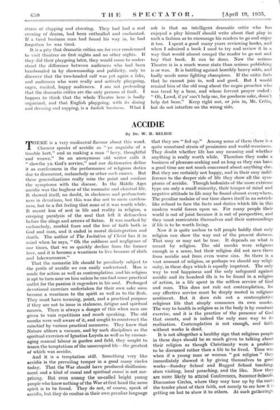AUDIENCES AND CRITICS
By J. B. PRIESTLEY THIS. is an appeal on behalf of the serious Theatre. -I must make it plain at once, however, that I take a cheerful and sensible view of the -Theatre. Some dramatists seem to think that playgoing is a civic:duty. I am. not one of them. The Theatre is not a Temple of anything;:. it is what it always was in this country —a .place of entertainment. There ought to be some- thing more than entertainment in -a good play ; but if, first of all,, there is not entertainment, then it is not a good --play, no matter how fine. its emotions, how profound its -ideas. Dramatic masterpieces, like Hamlet and The Cherry Orchard, are superb entertainments, They have to be. A dramatist has to co-operate with his audience in a way that is not necessary to the author of a.hook;:whose readers can take their own time, re-react, skip, and, generally adapt themselves to the work. Thus, :a-poor. third act kills a play, but though nine good novels out '43f ten do not end as• well as they began, nobody minds very much. But if people were compelled to sit through a reading of these inferior last chapters, there would soon be complaints.
There • is • nothing startling about the fact that the serious Theatre should be entertaining, or the fact that a good deal of dramatic entertainment should be fit to belong to • the serious Theatre. Intelligent adult persons should demand intelligent adult entertainment. This seems painfully obvious, and so it is—except in the world of the contemporary English Theatre. This Nvorld appears to be dominated by a mythical being called the Tired Business Man. He is important because apparently it is his money we want. Sometimes he is simply called Box Office. Now it is true- that those of us who produce plays in the West End of this city do badly want somebody's money, because the production of plays is a very expensive business. Rents, salaries advertisement • costs, all are high; and mount up in a nightmare- fashion. • And the ferocious competition of the Films not only reduces audiences but actually increases theatrical expenditure. If the- Tired Business Man is the fellow who is ready to buy - eight stalls, at twelve shillings and sixpence each, then he is the 'fellow we want. We -must have him, - - or we perish: Unfor- tunately I have never met him, find it difficult to believe in his existence, and the only persons who do appeal,' to know him are some ofthe dramatic critics. This brings me to my point. Apparently without knowing what they are doing, quite a number of our dramatic critics are busy hindering and not helping the serious Theatre. This is not a protest against what seem to me stupid and unconsidered judgements on plays. This is quite a different matter. It is a protest against a kind of notice that is at once friendly and ruinous. For they will say, in effect—yes, as they have just been saying about a certain piece of mine- " This is a fine play, beautifully acted and produced, but don't go and see it, you wouldn't like it." What is one to make of dramatic criticism of this kind ? It seems to me mischievous from every point of view. I respect the dramatic critic who writes about a play as if it were a priVate performance for himself, who -never mentions box offices, who sees the thing purely as a work of art and not as a social event and a financial enterprise. After all, a critic is invited to give his opinion of the piece. It has nothing to do with him whether •it is " good Box Office " or not ; he has not been asked to take a share in the production ; he is not a representative of a Ticket Agency.
Many critics, however, consider that it is part of their duty to act as a sort of dramatic guide to their readers, who expect to be told what to see and what not to see. This is not unreasonable. My complaint is that many of these critics assume that their readers are half-witted. They are careful to warn them off any play that has a glimmer of intelligence about it. The result is that they are no longer on the side of the serious Theatre. With Some further results, which readers may observe for themselves, as I have. Time after time, I have gone to big •silly shows that have been heartily recommended by these critics to the Tired Business Man. • The theatre has - been nearly full, at high prices, the night's takings amount- ing perhaps to about four hundred pounds. Yes, the tired business men have been there. They and their women have sat there in an ever-deepening gloom, and at the end of the performance have given a perfunctory clap, hurried their things on, and bolted for the nearest restaurant. The thing was -really n• dismal - fiasco. On the other hand, time after time have gone to see serious plays, against which the ordinary cheerful playgoer ha; been solemnly warned by these• critics, and I have seen the audience sit 'entranced at the end, then burst into a storm of clapping and cheering. They had had a real evening of drama, had been enthralled and enchanted.
• If a tired business man had found his way in, he had forgotten he was tired.
It is a pity that dramatic critics are for ever condemned . to visit theatres on first nights and no other nights. If they did their playgoing later, they would come to under- stand the difference between audiences who had been bamboozled in by showmanship and publicity, only to discover that the two-headed calf was yet again a fake, and audiences who were really and actively playgoing, eager, excited, happy audiences. I am not pretending that the dramatic critics are the only persons at fault. I happen to think that the whole Theatre here is badly organized, and that English playgoing, with its dining and dressing and supping, is a foolish business. What I . ask is that an intelligent dramatic critic who has enjoyed a play himself should write about that play in such a fashion as to encourage his readers to go and enjoy it too. I spent a good many years reviewing books, and when I admired a book I used to try and review it in a way that would almost compel the reader to go out and buy that book. It can be done. Now the serious Theatre is in a much worse state than serious publishing is or was. It is battling against horribly heavy odds, and badly needs some fighting champions. If the critic feels that he cannot join in, well and good. But I would remind him of the old song about the negro -preacher who was treed by a bear, and whose fervent prayer ended : " Oh, Lawd, if yo' can't help me, for goodness sake; doan't help dat bear." Keep right out, or join in, Mr. Critic, but do not interfere on the wrong side.







































 Previous page
Previous page